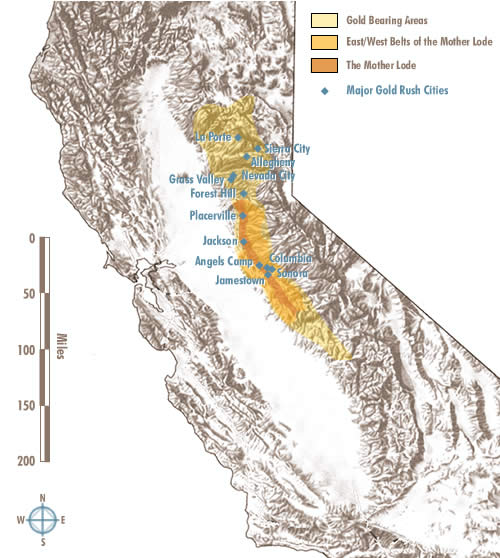

Coming to the mines later than other groups, many Chinese immigrants earned a living by working claims abandoned by other miners. Chinese Gold SeekersĬhinese gold seekers arrived in great numbers after 1851, and soon comprised about a fifth of the entire population in mining areas. Whether Joaquín Murieta ever actually existed is unknown, but he was celebrated as a hero by many Latin Americans enraged by oppressive American policies. The California legislature offered a huge reward and in 1853 a Texan named Harry Love produced the head of someone he insisted was Murieta. Rumors began to spread throughout gold country about a swashbuckling Mexican bandit named Joaquín Murieta who was striking back against American injustices. In the mining town of Sonora, Mexicans, Chileans, and Peruvians joined with French and German miners to protest the tax, only to be subdued by a hastily formed militia of white Americans. When Latin American miners refused to pay the impossibly high tax ($20 per month), white Americans had an excuse to drive them out of rich mining areas.
#California gold rush map license
Their early success led the California legislature to adopt a foreign miners’ license tax in 1850 aimed at "greasers," as all Latin Americans were called.

Mexicans and Chilenos were among the first foreigners to make it to California in 1848, and their proximity and mining expertise gave them an edge in the cutthroat competition of the mines. "Foreign Miners"Ĭalifornios feared losing their privileged status and being lumped in with the thousands of Spanish-speaking immigrants from Mexico and other parts of Latin America who arrived in California during the Gold Rush. Eight Californios participated in the California constitutional convention of 1849, but over time their political power declined along with their land base.

The Peralta family lost all but 700 of their 49,000 acres in the East Bay to lawyers, taxes, squatters, and speculators.
#California gold rush map full
The Treaty of Guadalupe Hidalgo, which ended the US-Mexican War, had granted Californios full US citizenship and promised that their property would be "inviolably respected." But the informality of Mexican land grants made legal claims difficult when miners, squatters, and homesteaders overran Californios' lands.Įven when Californio families won legal title to their lands, many found themselves bankrupt from attorney's fees or taxes. The imposition of American government in California reversed the fortunes of elite Californios, who slowly lost their power, authority, and land. Californios Lose Power, Land, and Privilege She echoed the sentiments of many native Californians struggling to preserve traditional ways in the midst of holocaust. "I do not like the white man because he is a liar and a thief," Isidora Filomena de Solano, a Patwin-speaking woman from the Bay Area, told an interviewer in 1874.

The Act for the Government and Protection of Indians, passed by the state legislature in 1850, denied native Californians the right to testify in court and allowed white Americans and Californios to keep natives as indentured servants. This led to cycles of violence as American miners - supported by the state government - organized war parties and sometimes slaughtered entire native groups. As foreigners methodically mined, hunted, and logged native groups' most remote hiding places, natives began raiding mining camps for subsistence. The state's native population plummeted from about 150,000 in 1848 to 30,000 just 12 years later. The disruptions of the Gold Rush proved devastating for California's native groups, already in demographic decline due to Spanish and Mexican intrusion. The arrival and departure of thousands of immigrants, the intensely multicultural nature of society, and the newness of American institutions made Gold Rush California a chaotic, confusing landscape for natives and newcomers alike. Many of these visitors had no interest in settling down in California, intending only to make their "pile" and return home with pockets full of gold. More than 300,000 gold seekers flooded California by 1850, bringing to the new American state an astonishing variety of languages, religions, and social customs. Already a meeting place for Mexicans, Russians, Americans, Europeans, and natives, the gold rush turned California into a truly global frontier where immigrants from every continent on earth now jostled. The discovery of gold in California in 1848 vastly accelerated changes that had been occurring since 1769.


 0 kommentar(er)
0 kommentar(er)
